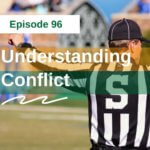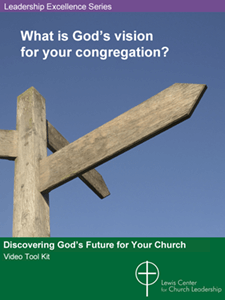
How can leaders respond to conflict in healthier, more productive ways? Brian Brown shares perspectives and practices that can help keep conflict from diverting too much energy from our churches.
Listen on Apple Podcasts | YouTube Music | Spotify
Watch on YouTube
- Transcript — Click or Tap to Read
-
Announcer: Leading Ideas Talks is brought to you by the Lewis Center for Church Leadership of Wesley Theological Seminary in Washington, DC. Subscribe free to our weekly e-newsletter, Leading Ideas, at churchleadership.com/leadingideas.
Leading Ideas Talks is also brought to you by Discovering God’s Future for Your Church. This turnkey video tool kit helps your congregation discern and implement God’s vision for your church’s next faithful steps. Discovering God’s Future for Your Church is available at churchleadership.com/vision.
How can leaders respond to conflict in healthier, more productive ways? In this episode, Brian Brown shares perspectives and practices that can help keep conflict from diverting too much energy from our churches.
Douglas Powe: Welcome to Leading Ideas Talks a podcast featuring thought leaders and innovative practitioners. I am Douglas Powe, the director of the Lewis Center and your host for this talk. Joining me is the Reverend Dr. Brian Brown, who is senior pastor of Woodland Faith UMC and a coach who specializes in conflict management. Our focus for this podcast is conflict management. I’m excited to have Brian with us. Welcome, Brian, to our podcast.
Brian Brown: Great to be with you, Dr. Powe.
Douglas Powe: I want to begin our conversation today, Brian, by having you share a little bit about how you got involved in helping others with conflict management, which we know is a really important topic. But how did this become an interest of yours? Most people run away from conflict. But you have an interest in helping others with conflict management.
Brian Brown: It started a long time ago actually, when I felt this call to conflict resolution, i.e., reconciliation, in many ways. For me it started with self-reconciliation within myself. I trace my amazement with several things going on within myself back to when I was nine-and-a-half or 10 and I played for a Boys Club baseball team. I was real active in all sports. And the awakening, the initial awakening, I’ll never forget it. I was the only African American on this Boys Club team. And the other team we were playing on this particular day was all white. I played second base during that time, second and shortstop, but, in this game, I was playing second base. And at the end of the game, we were shaking hands as you go through. I had had a really decent game. And the gentleman on the other team that played shortstop said, “You play pretty good for a nigger.” And I remember at that time, Dr. Powe, it was like a movie and time stood still as if God was watching and saying “Okay, let me see how you handle this.” And I remember, out of instinct, out of reaction even hearing this, having this space in my being that was watching me push this other team player down.
It baffled me for the longest because I remember there was a conflict within me. There was this one side of me that was at peace because I could justify what I did, and yet there was this other piece that was questioning the result. And so that was this initial “What is that all about? There’s a conflict going on within me. There’s a part at peace and there’s a part at war.” And so that began the journey from an application of solving conflict.
Then I would partner the next big experience when it comes to conflict under not application but interpretation. And this has a whole different lens in that it had to do with race again, right? Go figure. So, I’m in high school and I’d had my awakening, my born-again experience where my heart was strangely warmed, and I couldn’t wait to tell everybody about it. And it so happens a friend of mine — we were on the same football team, U.D. Mangrum who is an Anglo — and he said, “Hey man. Come tell folks at my church about this God you found.” Right? So, he invited me to an all-white Presbyterian congregation. And I know the average age was probably 75. So, I’m preaching, and I come out of the African American worship experience and that’s all I knew. I began preaching and there was dead silence, right? And I remember thinking, “Okay. You know they’re a little older. They can’t hear me that good.” So, I just started getting louder, right? And then, as I am looking around, there’s no dance, there’s no movement within the call and response. And I remember preaching from the paper and talking to God from my head. And I remember saying, “God, I thought you called me to this thing. This isn’t working. This is … something is drastically wrong.” Then I remember, Dr. Powe, sweating and still going on. Then, all of a sudden, there was an awareness that this was worship. And I remember leaving mesmerized, feeling like I had encountered the miraculous. There’s a whole ‘nother world out there that has to do with self-awareness.
And my capacity to be self-aware of the environment I’m in and what’s going on inside of me, external and internal awareness, was a game changer for literally everything. And that began a series of God events putting me in situations where it was more not out of fear but fear that turned into fascination, right? And so, I began to just be extremely excited about the energy that’s present in conflict.
In the book of Revelation, it talks about the Church of Laodicea, how they are lukewarm, right? And the story is told about how that church was really good for nothing because it wasn’t hot or cold. And I’ve found that there’s heat, there’s energy, in conflict, and if we’re able to transform, reconcile, bring self-awareness, then the chance for systemic change, sustainable change, is far greater in its capacity to bring change about than when there is no energy there. And so that kind of started my fascination around the power behind conflict and the components that, if adjusted appropriately, can lead to experiencing God in new ways and, i.e., one another in new ways.
Douglas Powe: Let me sort of pick up there when you’re talking about the power behind conflict and ask you what are some of the common conflicts you see or hear about in ministry settings? This is, I think, one of the areas where, in seminaries, students probably are not prepared as well to handle a conflict that may occur within their particular ministry setting. What are some of the common conflicts that you hear about that pastors or ministry leaders may face?
Brian Brown: Sure. At the end of the day, there is a certain level of self-conflict, and often that one is not lifted up initially when called in to bring about some resolution. But self-conflict …. There’s gender, race, age, socio-economic, political conflict — we live in an age where, more than ever, individuals’ politics inform their theology instead of theology informing their politics — historical understanding, biblical interpretation, right? And all of these have a common denominator of this multiplication factor, what I call “fear times lack of self-awareness.” You increase one of those, then you are going to start moving into areas where we become more and more and more reactionary out of self-preservation.
Douglas Powe: Just to continue in this vein, in a particular congregation, the first time they’ve had a female pastor, some in the congregation are upset about this. And, of course, you talked about fear; some of this is fear of the unknown that has taken place. How does the conflict get played out? Is it that the pastor is feeling that tension in the congregation? I mean, in some cases, people are actually saying things to her. How does the conflict start bubbling up to the forefront?
Brian Brown: It’s interesting that in some parts of the congregation, it will show up where some individuals have been around a long time and they’ll just come right out and say, “Hey, I don’t believe female pastors are ordained to preach or ordained to lead in the capacity of being an elder or the main shepherd of the church.” But that becomes less and less over time. Often it is masked in several ways. There is that thought, but there’s a conflict within that person knowing that that’s not really right. But, if they don’t resolve that conflict within themselves, it shows up in other ways. And then the ways that it shows up, that particular pastor generally becomes the object of greater scrutiny and microscopic evaluation with individuals often not even knowing what’s driving that. Something that’s overlooked or would have been overlooked if the pastor was a male all of a sudden becomes a game changer in needing to bring about change and needing to bring about this pastor being better in some ways. So, the microscopic is magnified.
Douglas Powe: Just one more question in this vein. What do you think — and of course I know you can’t really answer this — but those who are putting the pastor under a microscope or creating the tension, what do they hope to gain? Is the goal to get rid of the person? Is the goal to shame the individual? Is it all of the above? When it the endgame for individuals who are the root of conflict?
Brian Brown: Yeah. Great question. At the end of the day, it is maintaining the status quo. Fear of going into the unknown — we’ve got this internal wiring that we want homeostasis. We want things to remain the same. And the amygdala, where a lot of that is played out in our brain, is saying “Safe. Unsafe. Safe. Unsafe.” And when we get to some things that are tied to relationships and tied to experiences and unresolved issues within ourselves, then this thing plays out and there’s a warning sign in the reactionary response to resist the change.
Douglas Powe: That makes sense. Let’s go now to the other side of the fence and start talking about the practices or how you can actually deal with conflict. Can you share some ways, when this conflict bubbles up, no matter what it may look like — gender, political, race, or something else — what are some practices that can help leaders to deal with the conflict?
Brian Brown: Yeah. At the end of the day, this is a human condition. Another “Aha” for me, Dr. Powe, was just being led to put myself in situations where I was feeling insecure in knowing that territory. From moving from Virginia to Ohio to moving out of my context to a whole different context, there was this holy fear, right? It was all about increasing self-awareness, and, at the end of the day, the journey is towards self-awareness for all of us. And the more that we can own that, then the more we understand that this is a way that we all have the same insecurities and challenge of allowing transformation to take place.
As a superintendent, I remember praying, “God, I know you called me to this” but, year one, I’m saying, I still don’t see why. I know I’m here by design, but it hadn’t clicked what exactly I was to receive. I knew it was some kind of blessing God wanted me to receive because years earlier I ran from that call and felt whole about God’s saying, “No, that’s not what I want you to do” and then, three years later, hearing God, “You know, yep, this is what I want you to do.” I’m like “Wait a minute!” So, it’s the whole understanding of timing and “never say never.”
But I remember, about three years in, when I had the privilege to be blessed to superintend 124 churches and then be exposed to a lot more through the cabinet. The lights came on. And in my spirit — I had already pastored several churches and I remember in my spirit, without even any thought to it, assigning certain feelings, emotions, judgments around certain churches. And then it clicked that what I had experienced was not unique to First Church or Wesley Church or Second Street Church or this church, but there were things that were tied to the human condition that were predictable in the Body of Christ. And for me that was such a game changer because often as pastors, we’re always thinking the grass is greener on the other side, and the challenge is, first of all, we take ourselves to that green grass, and the other piece is the human condition — how we’re wired, what we are challenged and given the opportunity to overcome. And so that was a huge understanding in that these are things that we face in our call to be instruments of transformation.
Free Webinar — Register Now
Hybrid Evangelism: The New Reality for Congregations
Tuesday, March 1, Noon-1:30 p.m. Eastern
Join us for this timely and important webinar to learn ways to maximize your congregation’s potential for engaging hybrid evangelism. century. Learn more and register now.
Douglas Powe: Are there things that we should be mindful of that can help us move towards collaboration?
Brian Brown: Yeah. Several things come to mind. Let me start with an acronym for just basic practice and then finding the tools to be sharpened in these areas. So, the acronym I will use is PROPEL. The “P” — to start off — is being proactive, because we don’t have to ask our brain to engage to keep the status quo. It’s designed so it will respond, it will conclude, based on previous history, and it does not necessarily ask for new information. It will take five facts and conclude. So be proactive and less reactive in our posture. And we do that through prayer, right? Pray and determine what success looks like.
Remember that story I started with? The young boy that I pushed after he went through some name-calling. The problem that God had placed in the “Aha” was that you are right and wrong at the same time. You were right in your justification, but there was a deep calling that God calls us to for reconciliation, for transformation. And I was totally a failure in promoting any type of change, right? I perpetuated the same energy. So, what does success look like? Not like that. When we’re going into a situation, pray to determine what does success looks like in this situation.
The “R” is for roadblocks. Determine the roadblocks ahead of time that might seek to prevent success, whatever we’ve defined as success. And those roadblocks, there’s some internal and there’s some external. But if I’m going to make a journey, I can be efficient in not going down roads and turning around because it’s closed or because there’s no way across. Find out the roadblocks and be prayerful in that respect as well.
“E” I would say is engage the collaborators. And this is in every relationship that we have. Sometimes I’ve been dismal failures in trying to plan trips or activities or events with my family. Either I’m talking to one of the children — or young adults now — and I didn’t include other collaborators. It’s as simple as a conflict on schedules or conflict on what success looks like. So, if I keep the end in mind, you know, what God is calling me (not just me but us) to at the end of this, there are probably some collaborators that I can engage that will further increase the opportunity for sustainable success.
The next “P” is pursue self-awareness. What do I need to be aware of that could take me off my game? And a resource that I’ll share: Arbinger does a good job in understanding self-deception. So, pursue that conversation and resource.
Then the “E” in PROPEL is experiment. After the particular exercise, event, or activity, how did you do? And after that, learn from it — that’s the “L” — and adjust accordingly. So that’s something that I put out there, as far as just a basic framework of getting better. And then, of course, there are tools that you can use to become sharper at all of those.
Douglas Powe: That makes sense. So, given the acronym that you just shared, going back to the example we used of conflict for gender, how would then the pastor — I mean of course I’m hoping that you know — the goal would be for acceptance by the congregation, but of course we all know that that’s not going to happen 100 percent, no matter what. So, how would you, if you were coaching this particular pastor, how would you help her to think about what success might look like? And then, using your acronym, what are some things you would ask her to think about in terms of experimenting.
Brian Brown. Sure. So, for me, when a church is in conflict, I start using some of what Arbinger does really well, and that is implementing and developing an outward mindset. And what that is all about is becoming aware of when I am bringing perceptions, I am bringing conclusions, to a conversation before we find discovery. It basically is creating a spirit of humility, at the end of the day, saying, “God, what do you want to teach me in this?”; and being comfortable and being vulnerable in how I got to this place; and creating that safe place where we can come together in dialogue and say, “Hey, this is where I am”; and allowing individuals to first be aware of what they need to own because normally you’ll get called in not because it’s a “female pastor.” It’s been shaded and colored and been deflected towards “these” areas. But “these” areas have been magnified because of “that” area. So, you’ve got to take them back to the self-awareness. And often what happens is “those” areas become lesser areas of impasse, even if you never really get to the heart of the matter. But it’s the self-awareness that some deflection is going on and what’s really at the heart of the matter. And even if you get to a place of impasse, the beauty is, if it’s done right, you can get to agreeing to disagree in love. The more you do this — it can get complex, and I practice this intentionally — it shows up in different nuances. And time is always a factor, because there’s got to be that time of God: “Show me what I’m missing.”
Douglas Powe: To shift it just a little bit, we talked about what happens inside the congregation, but sometimes things happen outside of the congregation that get brought into the congregation. So, there’s something going on outside – family, community — that then gets brought into the congregation in terms of conflict. Do you deal with that in the same way? Or are there other things we should be aware of when it doesn’t actually start inside but starts outside of the congregation?
Brian Brown: Yeah. Again, that acronym works well in starting a framework of what success looks like and creating space for conversation and collaboration. Let me see if I can think of an example around something outside. If we look at our environment now, there is the interpretation of how individuals are responding to the vaccine. We have individuals that — in their families, there is conflict on whether or not to take the vaccine, and then that finds its way inside the church. And we can, depending on the level of that particular area, … or let me give you even a better analogy. If two people are in conflict, and let’s say it’s a conflict outside of the church, that spirit of conflict, if it’s heavy, is brought into the church, and it becomes contagious like a virus and it spreads.
Arbinger calls it “collusion” — and they define collusion not in the way we define that term in the DMV but collusion in the area where I am colluding with someone else in perpetuating the very problem I’m complaining of. I’m perpetuating, I’m adding to it without even realizing it. And we do this all the time. Often what happens is that it’s when we come to our meetings, our ministries in the church — and that’s why it’s so important to take a deep breath when you start just basic meetings with “How is it with your soul?” or some type of practice — because, if I just got a call from a loved one that’s going through something horrific or if I just got a call and something made me really upset because someone betrayed a trust or whatever, I’m coming in with that energy and that’s the lens I’m looking through. If that’s not known within the team, then I’m evaluating that person as if everything’s hunky-dory. Then there’s this tension that’s there that I haven’t named. Right? And so, initially, understand what we’re bringing into a particular context and/or meeting.
Another resource in that vein that I use these days — and it’s old. It’s been around for several decades now. It used to be called Strength Finders and now it’s called Gallop Strengths. And the concept is, when we come to our gatherings, first, let’s exhale. What do we bring into the room? Now, let’s be strategic in working out of our strengths. So, when Doug Powe talks, if I know that one of his main strengths is “Maximizer,” then I know Doug is going to take whatever idea there is and say, “Well, why can’t we do 15 things?” And he’s sitting next to Dr. Sarah and she’s looking at things from a “Connected” lens. Then, that’s going to take us in the direction of how other things can be added from other organizations. So, we look at one another from strengths. We understand those strengths, and we also understand when they’re vulnerable and not to work out of that, if they came to the gathering with some things on their mind.
Douglas Powe: Right, as we get ready to close, are there any last words that you would want to leave with individuals that you think would just help them to even try to prevent some conflict from happening? Are there signs that you can see, or something may start bubbling that you might be able to take action on early to prevent it from really becoming a full-blown sort of mess?
Brian Brown: One of the things — and I take this in a different direction than Arbinger does. They talk about when there’s a spirit of peace or spirit of war inside of us. I take that a step further when that spirit of war, when I’m trying to trudge ahead without the spirit of peace within me, without the Holy Spirit moving forward. To develop an awareness, self-awareness, just when something’s not right within me — that’s a sign to slow down and find out what’s going on.
Another resource, her name is Jill Bolte, and she wrote the book Whole Brain Living. And she talks about, in a nutshell, that when there’s an impulse that’s touched within us, it has about a 90-second cycle. This is a basic thing that will save some anxiety for you. When you feel an impulse that’s triggered, imagine a bicycle that’s been turned upside down and you got the tires on top, so when you spin that wheel, let’s say 90 seconds, if you don’t give it any energy, it will subside and then there will be the homeostasis again. What we often do is when that impulse comes up, we own it, and we start spinning the tire. We start adding energy to it. And then we end up way down the road. “How in the heck, man! I was at peace when I came to this movie. And I just got sideswiped and I’m all full of anxiety now.” So that would be a thing, the 90-second rule. Just stop. Watch it come and watch it go. We have that capacity. And then, after that, really understand what it means to spend some time understanding what’s going on.
Another easy rule is to tell someone “I’ll get back with you.” Find out when it’s never a good time for you to send an email. You know that self-experimentation. I’ve gone all through the process of even knowing, “Okay, this is a terrible time for me to send an email.” I don’t send emails late at night because my energy doesn’t give you the best. But I’ve experimented and even knowing that, Dr. Powe, I’ll craft an email the best that I can. And then the next day I’ll go and look at it and I am still so humbled that it is nowhere close to the offering that God wants me to give. I mean, “How can that be?” And so, this whole understanding of energy at the end of the day, I’m working on a new resource hoping to be out next year this time. It’s called The Faith Line: The Shortest Distance Between Two Points. Not the straight line, the faith line. It deals with energy, and often that’s what the amygdala does. “Warning. Warning. You are running out of energy. Batten down the hatches. Don’t change anything. Fight for this to stay the same.” And when we can develop that self-awareness, then we become the gift to the Body of Christ that God wants us to be, because if I change me, I change everything.
Douglas Powe: Well, Brian, thank you so much, this has been wonderful. I appreciate it, and appreciate your insights. They will be helpful for those who are dealing with conflict, as we all do at some point in time in our ministry.
Announcer: Thank you for joining us for Leading Ideas Talks. Don’t forget to subscribe free to our weekly e-newsletter, Leading Ideas, to be notified when new episodes are published. Visit churchleadership.com/leadingideas.
 Related Resources
Related Resources
- 5 Suggestions for Managing Conflict in Polarized Contexts by David R. Brubaker
- 9 Ways Leaders Can Respond to Conflict Constructively by Peter L. Steinke
- More Than a Nonanxious Presence by Patricia Farris
- Discovering God’s Future for Your Church Video Tool Kit





